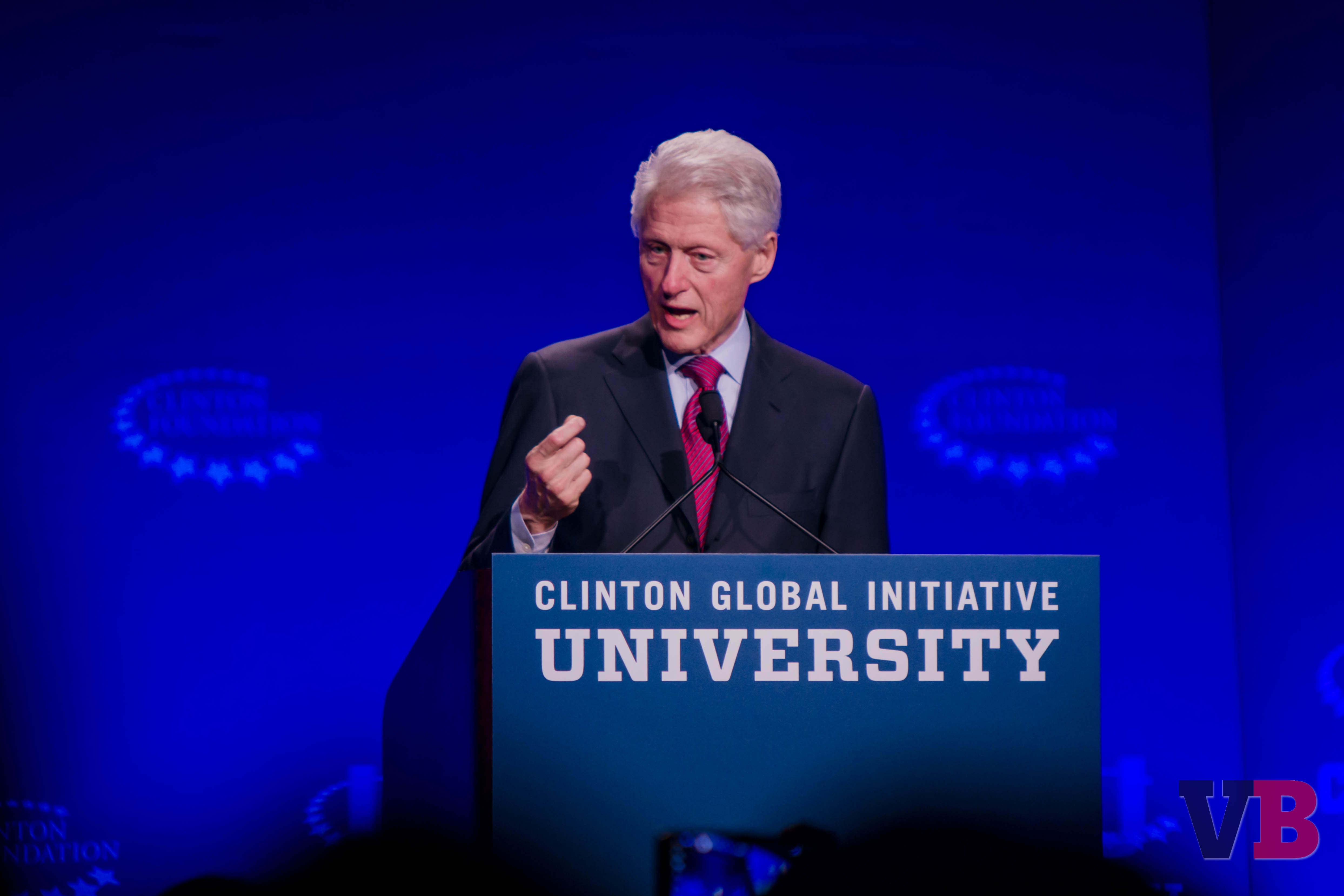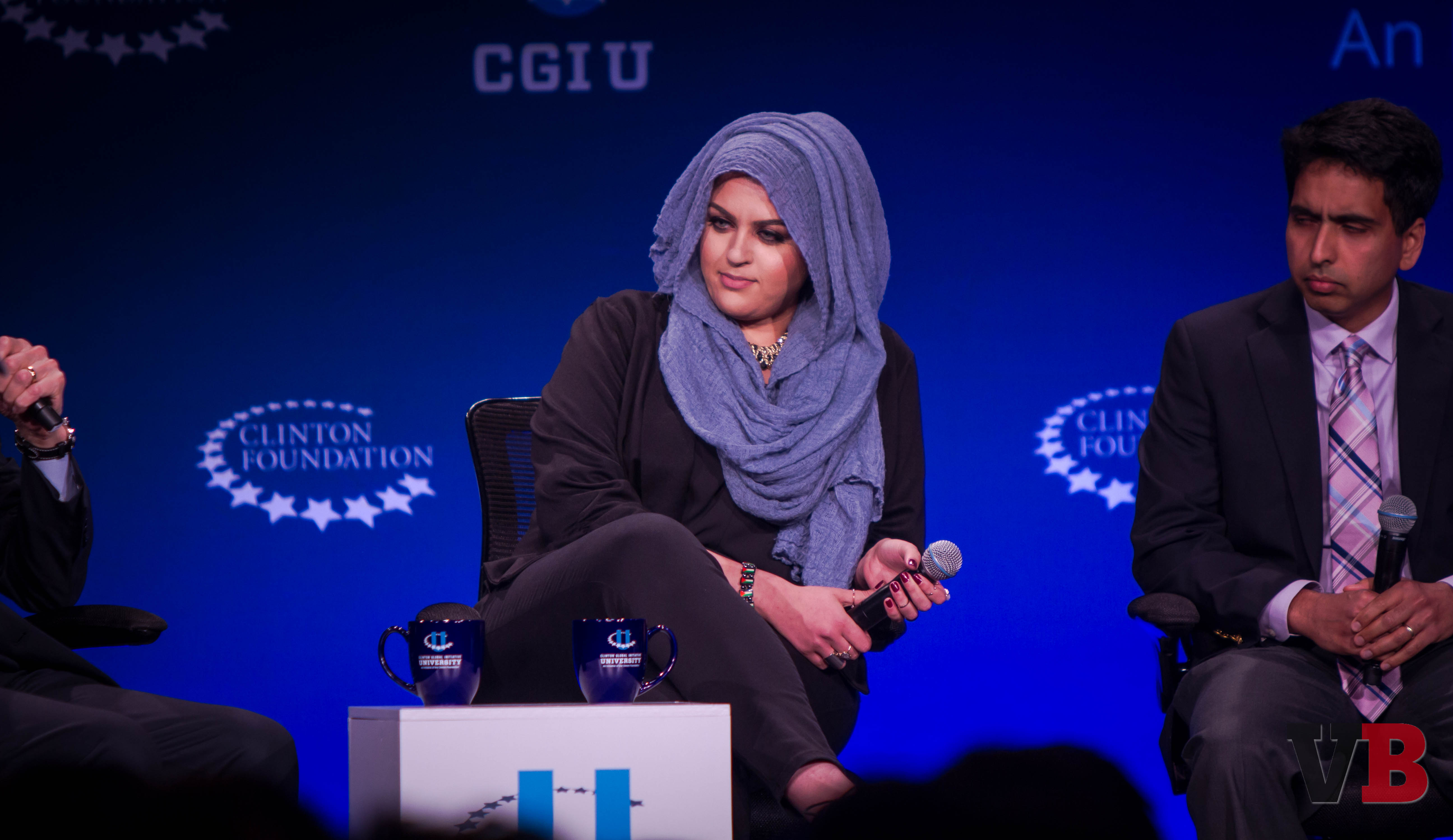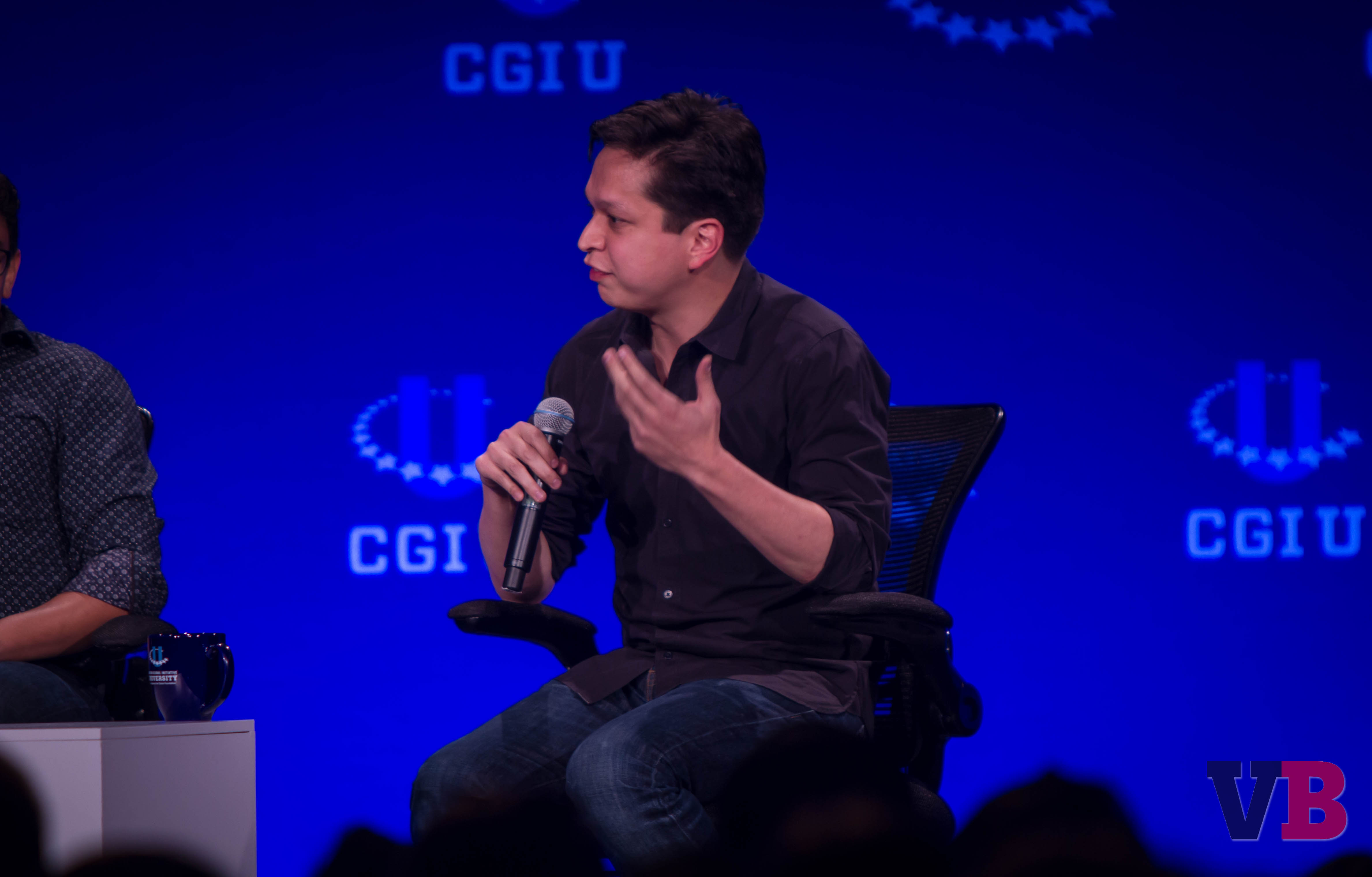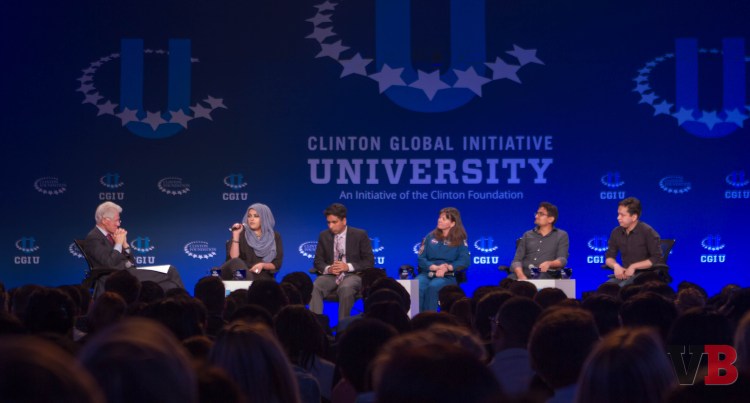Want smarter insights in your inbox? Sign up for our weekly newsletters to get only what matters to enterprise AI, data, and security leaders. Subscribe Now
BERKELEY — Bill Clinton said that an idea with a team behind it can change the world. To that end, he is encouraging the next generation of entrepreneurs to think about how they can best benefit society. He urged students to work together to make our communities a better place with this message: “Don’t stop dreaming.”
The 42nd president of the United States made an appearance at this year’s Clinton Global Initiative university event in the San Francisco Bay Area this weekend. More than 1,200 students gathered at the University of California at Berkeley campus to hear words of inspiration that will hopefully motivate them to move forward with their entrepreneurial projects.
“No one is too old or too young to make a difference,” proclaimed the foundation’s vice chairwoman and former president’s daughter, Chelsea Clinton. “What you all share is the courage to create, a refusal to see challenges as challenges, but rather as opportunity.”

Above: President Bill Clinton gives opening remarks at the 2016 Clinton Global Initiative event at the University of California, Berkeley campus on April 1, 2016.
At the event’s opening session, the elder Clinton moderated a panel filled with noted entrepreneurs and individuals who have made their marks on the world. Joining him were Amani Al-Khatahtbeh, founder and editor-in-chief of MuslimGirl.com; Salman Khan, founder and CEO of Khan Academy; Catherine Coleman, astronaut with NASA; Wael Ghonim, an internet activist; and Ben Silbermann, CEO of Pinterest.
“It’s an exciting time to be alive, but it’s a constant race between the forces of positive interdependence and negative ones,” the former president said in his opening remarks. “Every time I see you, I become convinced that the positive forces will win […]This is the model: Creating cooperation across networks with people of diverse experiences, changes, and knowledge.”
Don’t be afraid to create
The topic of the evening’s panel was the courage to create, and it wasn’t just about building the next startup or raising money. The panelists spoke about how they had moved past their fears and dared to buck the status quo in order to have a positive impact on the world. Clinton first asked each panelist how they overcame their fears.
“We sometimes don’t have the courage because it sometimes comes down to survival,” explained Al-Khatahtbeh. Her site, MuslimGirl, seeks to reclaim the narrative of Muslim women: “I believe I am moving the [consciousness] of a long line of Muslim women speaking truth to power…”

Above: Amani Al-Khatahtbeh, founder and editor-in-chief of MuslimGirl.com participates in a panel at the Clinton Global Initiative event on April 1, 2016.
“People mistake courage by having others that are fearless,” chimed in Ghonim. In 2011, he became internationally recognized as one of the leaders of the Arab Spring movement that toppled Egypt’s leader at the time, Hosni Mubarak, who had clung to power for more than 30 years.
“I started a Facebook page after the police killed a young man, and it quickly grew to 100,000 likes in a few days.” he shared. “I thought ‘Holy shit, what was going to happen?’ I started something that expressed my frustration and to get the police to stop the violence.” Ghonim described a moment when his identity had accidentally been leaked, which resulted in some sleepless nights during which he thought that state security would take him away. He shared that although he strongly wanted to change the system, he wasn’t without fear.

Above: Salman Khan, founder of Khan Academy, listens to a question being asked by former president Clinton at the Clinton Global Initiative event on April 1, 2016.
For Khan, who created the education service Khan Academy, the experience was somewhat more subtle. He wasn’t in fear for his life or concerned about people hating him — it was the outpouring of gratitude he received for his service that moved him. Years ago, he started tutoring family members and building software to help them learn. A friend suggested posting YouTube videos to help scale the lessons, but Khan initially rejected the idea, largely because he believed the video social network was a place where you found clips of “cats playing the piano.”
Eventually he gave it a shot and realized that people he’d never met found his methods appealing. Users sent him correspondences about how they had passed classes because of his help, or how Khan’s service had helped their disabled son, and more.
In 2009, Khan had to decide whether to leave his job as an analyst with a hedge fund to pursue an entrepreneurial adventure. Obviously, we know which route he took — Khan believed that his creation could accelerate change in the world.
Failure is an option, and it’s okay
There are those who are “courageous, great, and have no failures, and then there’s us,” Ghonim said. “We tend to repeat the stories of the great leaders of the world, but there are few stories about their failures.” He cited a quote by Winston Churchill: “Success is not final, failure is not fatal: It is the courage to continue that counts.”

Above: Catherine Coleman, NASA astronaut, speaks at the Clinton Global Initiative university event on April 1, 2016
The panelists spoke about the fear of failing as something that entrepreneurs need to overcome, even though those in Silicon Valley don’t seem to worry about it. After all, this is the land where the mantra “Fail fast” came about. For Coleman, a NASA astronaut, one of the things she’s scared about is making a mistake in space. But she overcomes this by telling herself: “in my heart of hearts, that I’ve done all my practicing and that I’ve done all my best to prepare. If you do your best, there’s nothing more that anyone can ask of you.”
Even tech founders have to be courageous when starting new endeavors. Silbermann shared that didn’t find immediate success with Pinterest — it took two failed companies before he found gold with the visual search engine platform. In the beginning, there were only a few users on the site, but Silbermann’s resolve didn’t change — he cherished knowing that someone loved what his team had made, and he pushed forward one step at a time. “Be alive to other possibilities in your life,” he said. “If you’re alive to what’s around you, it sometimes catches fire,” which is exactly what happened with Pinterest.

Above: Ben Silbermann, cofounder and CEO of Pinterest speaks at the Clinton Global Initiative university event on April 1, 2016.
“People in leadership in countries, companies, and non-governmental organizations (NGOs) find it impossible to say ‘We tried this and it was wrong,’ and they think this because [if they admit it], the clamoring class will jump on any admission of error as a measure of incompetence,” Clinton opined. “People every day have to look in the mirror and ask why they made a mistake. It’s one of the things that leaves a lasting impression.”
Just keep dreaming
Throughout the nearly two-hour session, Clinton and the panelists offered insight into their respective journeys. And while each had experienced plenty of doubt and failure, and sometimes even hate, their message remained the same: Keep trying. It might take some time. Don’t give up on your ambitions.

Above: Five project cofounders talked about their work at the Clinton Global Initiative university event on April 1, 2016. Here they appear in a photo with former president Clinton.
Every student in attendance at the Clinton Global Initiative university event is an entrepreneur. As part of their admission to the program, they have committed to trying to solve a problem that they’re passionate about. These students include a team at Georgia Tech that designed a mobile toilet as a means to halt the spread of hygiene-related diseases; one from the University of Pennsylvania that helps LGBTQ asylum seekers integrate into their host country by providing them with pro bono services, informational webinars, and other resources; and one that aims to improve STEM education for women in Africa through internships, mentorship, and support from other female scientists and researchers.
“We should never shy away from our personal stories…we need to have the courage to put it forward,” said Al-Khatahtbeh. “It’s those stories that make us human, empathize with each other. It’s how we can truly change the world.”
Depending on the future for help
The Clinton Global Initiative is targeting college students, many of whom are already developing projects to tackle issues they think are important. With the support of a strong education from an academic institution, the foundation thinks that the next generation will be able to overcome many obstacles that our society currently faces.
While the event is meant to be non-partisan, political issues surfaced at several points during the evening. As Clinton was completing his opening remarks, a protester shouted at him from the audience. Clinton replied sternly: “We are not at a political event, and I won’t respond” and added that if the protester wanted to, he would meet him outside to talk further. There was no word about whether the two actually met after the event.
Other political views were expressed, specifically from Nicholas Dirks, the chancellor of UC Berkeley, who spoke out about the deplorable condition of education in the country, and from Richard Blum — a regent for the university and husband to Senator Dianne Feinstein — who made a somewhat impassioned plea in favor of a Hillary Clinton presidency.
The Clinton Global Initiative university event continues on Saturday with more sessions and will conclude on Sunday with a community service project at the Havenscourt and Lowckwood campuses in Oakland, Calif. These events will feature both Clinton and his daughter, along with NFL player Marshawn Lynch.


